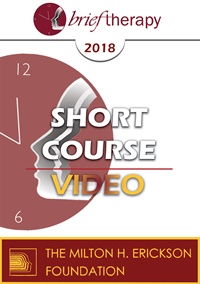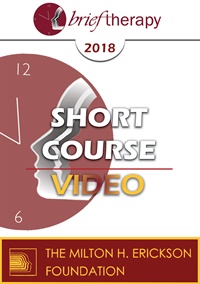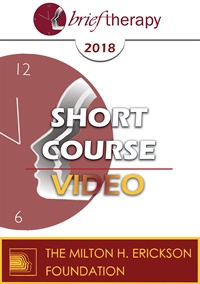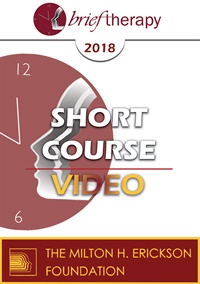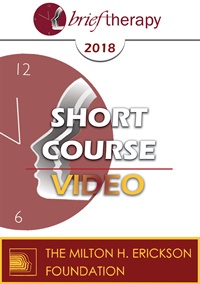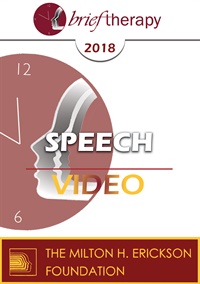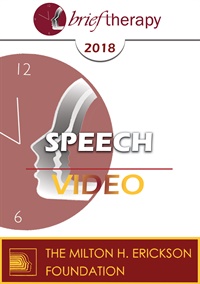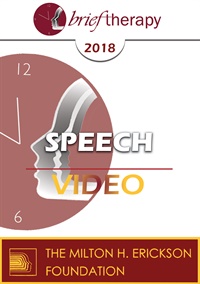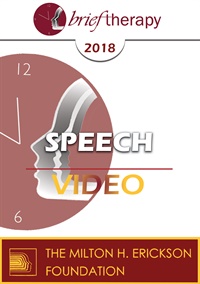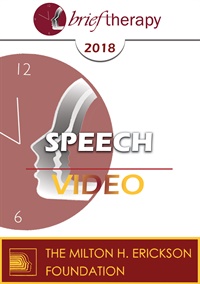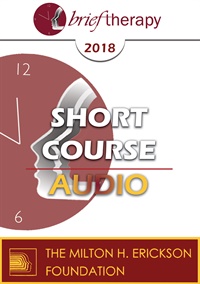
- Average Rating:
- Not yet rated
- Topic Areas:
- Short Courses | Depression | Eating Disorders | Brief Therapy | Hypnotherapy | Weight Loss
- Categories:
- Brief Therapy Conference | Brief Therapy Conference 2018
- Faculty:
- Margot Gotte-El Fartoukh, Dr. phil
- Duration:
- 1:26:23
- Format:
- Audio Only
- Original Program Date:
- Dec 06, 2018
- Short Description:
- The control of body weight is largely remote instinctively. When conscious efforts go nowhere, hypnotherapeutic strategies can open new possibilities. Presented is a model of hypnotherapeutic strategies of weight regulation introduced on the M.E.G. Congress 2018 in Bad Kissingen (Germany).
- Price:
- $15.00 - Base Price
Credit available - Click Here for more information
- Average Rating:
- Not yet rated
- Topic Areas:
- Short Courses | Brief Therapy | Belief Systems | Pain and Healing
- Categories:
- Brief Therapy Conference | Brief Therapy Conference 2018 | Online Continuing Education
- Faculty:
- Timothy Hallbom, MSW | Kris Hallbom, BA
- Course Levels:
- Master Degree or Higher in Health-Related Field
- Duration:
- 1:17:03
- Format:
- Audio and Video
- Original Program Date:
- Dec 06, 2018
- Short Description:
- Dynamic Spin Release™ is a powerful set of processes that allows users to quickly release their negative thought patterns and emotions, limiting beliefs and physical pain – in just one brief session.
- Price:
-
Sale is $29.00
price reduced from Base Price - $59.00
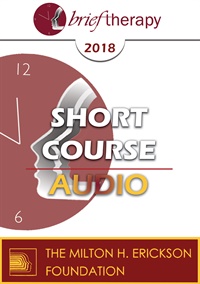
- Average Rating:
- Not yet rated
- Topic Areas:
- Short Courses | Brief Therapy | Psychotherapy
- Categories:
- Brief Therapy Conference | Brief Therapy Conference 2018
- Faculty:
- Melanie McGhee, LCSW
- Duration:
- 1:28:08
- Format:
- Audio Only
- Original Program Date:
- Dec 06, 2018
- Short Description:
- After a brief exploration of the six principles of Acceptance and Integration Training, participants will learn a simple method for helping clients recognize distorted thoughts AS distorted.
- Price:
- $15.00 - Base Price
Tags: Brief Therapy Psychotherapy
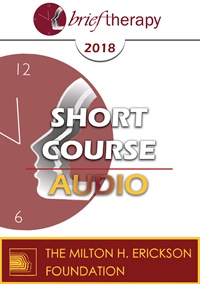
- Average Rating:
- Not yet rated
- Topic Areas:
- Short Courses | Dreamwork | Psychotherapy | Brief Therapy | Consciousness
- Categories:
- Brief Therapy Conference | Brief Therapy Conference 2018
- Faculty:
- Bruce Fordham, MA/CMHC
- Duration:
- 1:25:38
- Format:
- Audio Only
- Original Program Date:
- Dec 06, 2018
- Short Description:
- This workshop will provide a basic understanding of how to utilize dreamwork in psychotherapy, thereby providing an excellent alternative for patient care - especially when a patient's defenses are strong.
- Price:
- $15.00 - Base Price
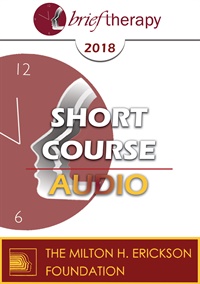
- Average Rating:
- Not yet rated
- Topic Areas:
- Short Courses | Brief Therapy | Art and Creativity | Psychotherapy | Solution Oriented Approach
- Categories:
- Brief Therapy Conference | Brief Therapy Conference 2018
- Faculty:
- George Ferrick, MA
- Duration:
- 1:24:31
- Format:
- Audio Only
- Original Program Date:
- Dec 06, 2018
- Short Description:
- This workshop will describe strategies and approaches adapted from brief and solution focused therapy. These enhanced mediation with creative ways to set a tone and reduce anxiety and resistance; to give voice to participants while getting to the heart of the matter; to unlock narrow positions, break through impasses, move to broader viewpoints, and co-create solutions.
- Price:
- $15.00 - Base Price
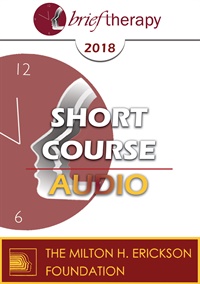
- Average Rating:
- Not yet rated
- Topic Areas:
- Short Courses | Anxiety | Brief Therapy | Utilization | Ericksonian Hypnosis and Therapy Techniques | Experiential Therapy
- Categories:
- Brief Therapy Conference | Brief Therapy Conference 2018
- Faculty:
- Wei-Kai Hung, M.Ed., L.M.H.C., L.P.C.
- Duration:
- 1:25:01
- Format:
- Audio Only
- Original Program Date:
- Dec 06, 2018
- Short Description:
- Alchemy is about transformation process (Linear). Taoism is about going with flow (Circular). Ericksonian is about utilization and experiential therapy (Infinite Possibilities). This experiential workshop will utilize the best of eastern and western philosophical concepts to treat anxiety effectively and efficiently.
- Price:
- $15.00 - Base Price
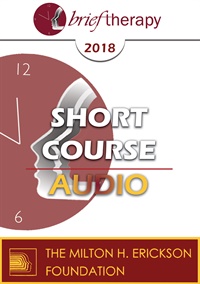
- Average Rating:
- Not yet rated
- Topic Areas:
- Short Courses | Anxiety | Brief Therapy | Family Therapy
- Categories:
- Brief Therapy Conference | Brief Therapy Conference 2018
- Faculty:
- Dhara Meghani, PhD | Paulina Barahona, MS
- Duration:
- 1:25:43
- Format:
- Audio Only
- Original Program Date:
- Dec 06, 2018
- Short Description:
- Parentline is a telehealth service developed by psychologists at University of San Francisco for families with children birth to three. Presenters will detail this protocol and its integration with the delivery of focused, skill-based interventions, which research indicates is especially supportive for new parents. Pilot study results of the protocol, which is hypothesized to increase parenting confidence, decrease anxiety and depressive symptoms, and improve perceptions of support in the first six months postpartum, will be shared.
- Price:
- $15.00 - Base Price
Credit available - Click Here for more information
- Average Rating:
- Not yet rated
- Topic Areas:
- Short Courses | Priming | Brief Therapy | Resistance
- Categories:
- Brief Therapy Conference | Brief Therapy Conference 2018 | Online Continuing Education
- Faculty:
- Clifton Mitchell, PhD
- Course Levels:
- Master Degree or Higher in Health-Related Field
- Duration:
- 1:28:19
- Format:
- Audio and Video
- Original Program Date:
- Dec 06, 2018
- Short Description:
- This presentation will introduce participants to the concept of priming, review selected research, and demonstrate its implications in resolving therapeutic roadblocks and creating therapeutic movement. Implications relative to the management of resistance will be a predominant theme.
- Price:
-
Sale is $29.00
price reduced from Base Price - $59.00
Credit available - Click Here for more information
- Average Rating:
- Not yet rated
- Topic Areas:
- Short Courses | Brief Therapy | Children and Adolescent Therapy
- Categories:
- Brief Therapy Conference | Brief Therapy Conference 2018 | Online Continuing Education
- Faculty:
- Susan Pinco, PhD
- Course Levels:
- Master Degree or Higher in Health-Related Field
- Duration:
- 1:31:28
- Format:
- Audio and Video
- Original Program Date:
- Dec 06, 2018
- Short Description:
- Brainspotting is a powerful tool that allows you to circumvent many of the frustrating and challenging issues that frequently impede efforts to help children, teens and adults. By engaging your clients in this active and creative process, Brainspotting allows the counselor and client to work together to amplify the client’s innate ability to heal, grow and change, often with astounding speed.
- Price:
-
Sale is $29.00
price reduced from Base Price - $59.00
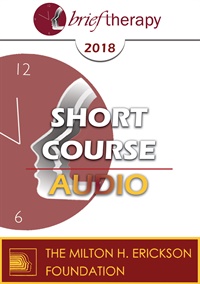
- Average Rating:
- Not yet rated
- Topic Areas:
- Short Courses | Communication | Multicultural | Sex and Sexuality | Brief Therapy
- Categories:
- Brief Therapy Conference | Brief Therapy Conference 2018
- Faculty:
- Mitra Rashidian, PhD
- Duration:
- 1:30:26
- Format:
- Audio Only
- Original Program Date:
- Dec 06, 2018
- Short Description:
- In this workshop, clinicians’ level of comfort, barriers, and attitudes when talking about sexuality will be highlighted, along with useful strategies to provide better engagement with their clients. Additional strategies used to build upon a person’s individual strengths to assist them in overcoming cultural and personal sexual imprints are offered.
- Price:
- $15.00 - Base Price
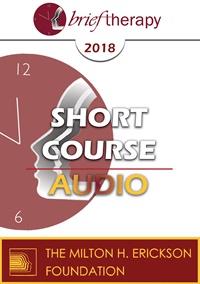
- Average Rating:
- Not yet rated
- Topic Areas:
- Short Courses | Brief Therapy | Family Therapy | Resistance
- Categories:
- Brief Therapy Conference | Brief Therapy Conference 2018
- Faculty:
- Mercedes Samudio, LCSW
- Duration:
- 1:30:44
- Format:
- Audio Only
- Original Program Date:
- Dec 06, 2018
- Short Description:
- In this training, the presenter will focus on what it means to work effectively with resistant parents and keep them engaged during the therapeutic process. We’ll explore the role a parent plays in a family’s ability to change, successfully maintain those changes, and what strategies clinicians can use to bypass parental resistance to develop a therapeutic alliance that empowers parents and heals families.
- Price:
- $15.00 - Base Price
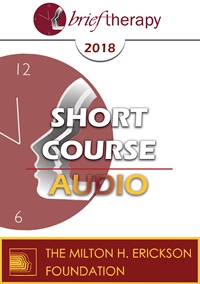
- Average Rating:
- Not yet rated
- Topic Areas:
- Short Courses | Humor | Psychotherapy | Brief Therapy | Relationships
- Categories:
- Brief Therapy Conference | Brief Therapy Conference 2018
- Faculty:
- Steven Sultanoff, Psychologist
- Duration:
- 1:18:02
- Format:
- Audio Only
- Original Program Date:
- Dec 06, 2018
- Short Description:
- Integrating therapeutic humor into psychotherapy is more than simply using humor with clients. This presentation will explore how and why integrating humor into clinical practice can be effective as well as assist clinicians to use humor with clinical awareness. Participants will learn a model of clinical humor that provides a foundation for the use of humor in psychotherapy and discover how humor (when purposely chosen as a clinical intervention) can be used as a relationship enhancing intervention, as well as a diagnostic and treatment tool.
- Price:
- $15.00 - Base Price
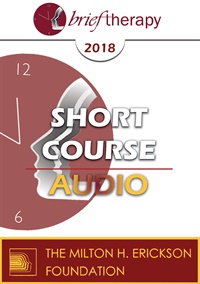
- Average Rating:
- Not yet rated
- Topic Areas:
- Short Courses | Psychotherapy | Awareness Integration Model | Brief Therapy | Anxiety | Depression
- Categories:
- Brief Therapy Conference | Brief Therapy Conference 2018
- Faculty:
- Foojan Zeine, Psy.D., MFT
- Duration:
- 1:16:41
- Format:
- Audio Only
- Original Program Date:
- Dec 06, 2018
- Short Description:
- The clinical method of the Awareness Integration model has evolved from Cognitive, emotional, Behavioral, body-oriented, and trauma releasing theories and has been researched with a diverse population with significant results toward minimizing Depression and Anxiety.
- Price:
- $15.00 - Base Price
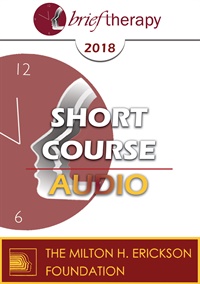
- Average Rating:
- Not yet rated
- Topic Areas:
- Short Courses | Brief Therapy | Motivation | Utilization
- Categories:
- Brief Therapy Conference | Brief Therapy Conference 2018
- Faculty:
- John Lentz, D. Min.
- Duration:
- 1:29:35
- Format:
- Audio Only
- Original Program Date:
- Dec 06, 2018
- Short Description:
- While this workshop teaches useful tools for brief therapy, it also will give participants positive experiences for themselves. This workshop evokes experiences that lead clients to discover solutions that work. Whether the client experiences their solution, or has a dramatic shift in understanding their options it often leads to motivation and success.
- Price:
- $15.00 - Base Price
Credit available - Click Here for more information
- Average Rating:
- Not yet rated
- Topic Areas:
- Short Courses | Borderline | Brief Therapy | Personality Disorders
- Categories:
- Brief Therapy Conference | Brief Therapy Conference 2018 | Online Continuing Education
- Faculty:
- Michael Munion, MA, LPC
- Course Levels:
- Master Degree or Higher in Health-Related Field
- Duration:
- 1:29:43
- Format:
- Audio and Video
- Original Program Date:
- Dec 06, 2018
- Short Description:
- Brief Treatment with the Borderline Personality Disorder (BPD) patient makes no pretense at wholesale personality reconstruction, but rather considers the impact of the disorder on the therapy process in order to enhance the probability of success in successive brief episodes of care. This workshop reviews the etiology of BPD from both the Object Relations and the Psycho-social viewpoints. Specific protocols for dealing with issues such as Self-injurious behavior and Suicidal Ideation are reviewed.
- Price:
-
Sale is $29.00
price reduced from Base Price - $59.00
Credit available - Click Here for more information
- Average Rating:
- Not yet rated
- Topic Areas:
- Short Courses | Energy Psychology | Psychology | Trauma | Brief Therapy
- Bundle(s):
- Learning Track - Turn Down the Trauma
- Categories:
- Brief Therapy Conference | Brief Therapy Conference 2018 | Online Continuing Education
- Faculty:
- Robert Schwarz, PsyD
- Course Levels:
- Master Degree or Higher in Health-Related Field
- Duration:
- 1:29:42
- Format:
- Audio and Video
- Original Program Date:
- Dec 06, 2018
- Short Description:
- Energy Psychology (EP) is a family of focused and brief approaches to releasing stuck energy in the mindbody system that usually is the result of unresolved small “t” or big “T” trauma. This workshop presents an elegant integration of Interpersonal neurobiology, polyvagal theory and memory reconsolidation that underlies energy psychology approaches to trauma treatment. Participants will learn how to incorporate this “power therapy” with their current methods to regulate emotional over-arousal and escalating patterns of reactivity while creating greater personal empowerment. Discover how to actually remove the traumatic energy/emotions from traumatic events that facilitates insight, mindfulness and post traumatic growth. Both the current research and the basic clinical protocols will be presented.
- Price:
-
Sale is $29.00
price reduced from Base Price - $59.00
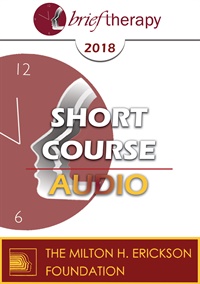
- Average Rating:
- Not yet rated
- Topic Areas:
- Short Courses | Anxiety | Communication | Depression | Neurobiology | Brief Therapy
- Categories:
- Brief Therapy Conference | Brief Therapy Conference 2018
- Faculty:
- Bart Walsh, MSW
- Duration:
- 1:29:10
- Format:
- Audio Only
- Original Program Date:
- Dec 06, 2018
- Short Description:
- Chronic anxiety and depression present significant challenges for those affected by these conditions. A behavioral treatment which accesses deep levels of mindbody functioning facilitates remission of these debilitating conditions. This treatment, conceptualized as essential neurobiological communication (ENBC), incorporates a form of body language known as ideomotor signaling. Because these are chronic conditions, the affected individual learns how to fully manage these states on their own. Also presented is a noninvasive, structured protocol for reducing the adverse influence of unresolved emotion on present experience. Essential to this model is a progressive ratification sequence intended to ground emotional adjustments in thought, perception and behavior. This brief procedure is a useful adjunct to other treatment modalities and instrumental
- Price:
- $15.00 - Base Price
Credit available - Click Here for more information
- Average Rating:
- Not yet rated
- Topic Areas:
- Speeches | Mindfulness | Narcissism | Brief Therapy | Self-Esteem
- Categories:
- Brief Therapy Conference | Brief Therapy Conference 2018 | Online Continuing Education
- Faculty:
- Ronald Siegel, PsyD
- Course Levels:
- Master Degree or Higher in Health-Related Field
- Duration:
- 1:00:31
- Format:
- Audio and Video
- Original Program Date:
- Dec 09, 2018
- Short Description:
- What if our therapeutic goals of improving self-esteem, developing a stable and coherent sense of self, and expressing our authentic feelings all turn out to be misguided? What if they inadvertently feed the cultural enthusiasm for celebrity and success that makes so many of us miserable? This presentation will examine how mindfulness practices can be harnessed in psychotherapy to reexamine our conventional sense of self, leading both us and our clients toward greater well-being, wisdom, and compassion.
- Price:
-
Sale is $29.00
price reduced from Base Price - $59.00
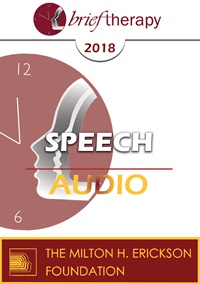
- Average Rating:
- Not yet rated
- Topic Areas:
- Speeches | Multicultural | Strategic Therapy | Brief Therapy | Strengths-Based
- Categories:
- Brief Therapy Conference | Brief Therapy Conference 2018
- Faculty:
- Terry Soo-Hoo, PhD
- Duration:
- 1:42:11
- Format:
- Audio Only
- Original Program Date:
- Dec 09, 2018
- Short Description:
- The Culturally Sensitive Strength-Based Strategic Therapy method was developed to integrate various principles founded by the Mental Research Institute (MRI) and Jay Haley’s Strategic Therapy approach as well as other methods to address these issues. In this workshop, guidelines will be presented for learning the principles of Culturally Sensitive Strength-Based Strategic Therapy. There will be an emphasis on effective strategies in working within the cultural context of the client and how this is critical to successful therapy. A structure will be presented for organizing the specific tasks and skills involved in different aspects of the method including activating the client’s strengths. Case examples, some on video recordings, will illustrate many innovative brief therapy techniques.
- Price:
- $15.00 - Base Price
Credit available - Click Here for more information
- Average Rating:
- Not yet rated
- Topic Areas:
- Speeches | Trauma | Brief Therapy | Future Oriented | Post-Traumatic Stress Disorder (PTSD)
- Categories:
- Brief Therapy Conference | Brief Therapy Conference 2018 | Online Continuing Education
- Faculty:
- Bill O'Hanlon, MS
- Course Levels:
- Master Degree or Higher in Health-Related Field
- Duration:
- 57:49
- Format:
- Audio and Video
- Original Program Date:
- Dec 09, 2018
- Short Description:
- People with post-traumatic stress often suffer for years and develop a variety of troubling and often crippling problems. This talk will detail a philosophy and methods of working briefly and effectively with people who have been traumatized. An array of new methods have shown that previous conceptions and methods of working with trauma are unnecessarily long-term and re-traumatizing. These new approaches, rather than being based on the past and deterministic models, are oriented towards the present and future and a sense of possibilities. You will leave equipped with a different understanding of how to treat trauma and four specific methods you can use right away in your work.
- Price:
-
Sale is $29.00
price reduced from Base Price - $59.00
Credit available - Click Here for more information
- Average Rating:
- Not yet rated
- Topic Areas:
- Speeches | Belief Systems | Brief Therapy | Neuroscience
- Categories:
- Brief Therapy Conference | Brief Therapy Conference 2018 | Online Continuing Education
- Faculty:
- Robert Dilts, BA
- Course Levels:
- Master Degree or Higher in Health-Related Field
- Duration:
- 1:01:49
- Format:
- Audio and Video
- Original Program Date:
- Dec 09, 2018
- Short Description:
- ]Managing the process of change involves working with a number of levels of key factors. These factors include our environment (where and when we act), our behavior (what we do), our capabilities (how we think and plan), our values and beliefs (why we think and act the way we do), and our identity (who we perceive ourselves to be) and our sense of purpose (for whom and for what we dedicate ourselves). The presentation will explore the relevance of these different levels of influence to brief therapy and how they may be identified and addressed to help clients reach their therapeutic goals.
- Price:
-
Sale is $29.00
price reduced from Base Price - $59.00
Credit available - Click Here for more information
- Average Rating:
- Not yet rated
- Topic Areas:
- Speeches | Children and Adolescent Therapy | Art and Creativity | Brief Therapy | Family Therapy | Anxiety | Depression | Goals of the Therapist
- Categories:
- Brief Therapy Conference | Brief Therapy Conference 2018 | Online Continuing Education
- Faculty:
- Lynn Lyons, LICSW
- Course Levels:
- Master Degree or Higher in Health-Related Field
- Duration:
- 1:02:45
- Format:
- Audio and Video
- Original Program Date:
- Dec 09, 2018
- Short Description:
- We don't often think of creativity and problem solving as equal partners in therapy with children. But when struggling families arrive at your office, it is the immediate blending of these two components that allows you and the family to move quickly from overwhelmed to engaged, confused to targeted. Based on 29 years of successes and failures, this speech will offer ideas to immediately connect with families, help them untangle the tired messiness they often arrive with, and create active interventions that build momentum, create new patterns, and offer hope.
- Price:
-
Sale is $29.00
price reduced from Base Price - $59.00
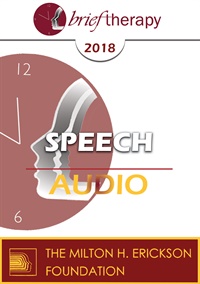
- Average Rating:
- Not yet rated
- Topic Areas:
- Speeches | Brief Therapy | Trauma | Anxiety | Hypnosis | Pain and Healing | Dissociation
- Categories:
- Brief Therapy Conference | Brief Therapy Conference 2018
- Faculty:
- Camillo Loriedo, MD, PhD
- Duration:
- 1:00:42
- Format:
- Audio Only
- Original Program Date:
- Dec 09, 2018
- Short Description:
- Dissociative hypnotic intervention demonstrated to be very useful in treating pain, anxiety disorders and many other conditions. But hypnosis can as well reactivate the natural mind processes, contributing to reconnect different parts (distinct modes of information processing) into a functional and unified self, particularly after traumatic experiences. Rapport, the special relationship that produces intense interpersonal links and connections, as well as profound disconnections with non-hypnotic reality, can be considered a crucial factor of brief therapeutic approach to dissociative conditions and trauma. How to use rapport as well as other new specific therapeutic interventions to reestablish the natural integrative links in a dissociative mind and relationship will be outlined in this presentation.
- Price:
- $15.00 - Base Price
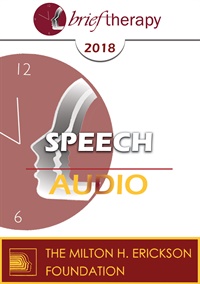
- Average Rating:
- Not yet rated
- Topic Areas:
- Speeches | Brief Therapy | Psychotherapy | Solution Oriented Approach
- Categories:
- Brief Therapy Conference | Brief Therapy Conference 2018
- Faculty:
- Elliott Connie, MA, LPC
- Duration:
- 59:30
- Format:
- Audio Only
- Original Program Date:
- Dec 09, 2018
- Short Description:
- The Solution Focused Approach is a widely accepted way of conducted psychotherapy sessions. Over the past 40 years this approach has come to be known for its brevity, pragmatism and positive stance. However, many inaccurate myths about this approach exist which impact many clinicians' ability to understand, and subsequently use, this approach. There is one misunderstanding that stands above all others, and this workshop will directly address this common misunderstanding while showing to not succumb to this idea and how to follow the true essence of Solution Focused work.
- Price:
- $15.00 - Base Price
Credit available - Click Here for more information
- Average Rating:
- Not yet rated
- Topic Areas:
- Speeches | Psychotherapy | Art and Creativity | Brief Therapy | Resources
- Categories:
- Brief Therapy Conference | Brief Therapy Conference 2018 | Online Continuing Education
- Faculty:
- Stephen Gilligan, PhD
- Course Levels:
- Master Degree or Higher in Health-Related Field
- Duration:
- 1:01:12
- Format:
- Audio and Video
- Original Program Date:
- Dec 09, 2018
- Short Description:
- Therapy is successful when clients are able to experience significantly changed realities. While the identification and transformation of symptoms is important in this regard, the activation of the client's creative capacity to make positive changes is even more important. This paper will explore how the 6-step model of Generative Psychotherapy provides a disciplined yet flexible process for helping clients claim and use their agency for creative change.
- Price:
-
Sale is $29.00
price reduced from Base Price - $59.00


